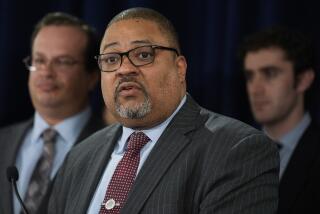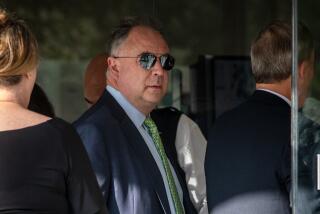Dowie’s sentencing in fraud delayed
- Share via
A federal judge on Monday delayed sentencing for former public relations executive Douglas R. Dowie, but not before making comments favorable to both sides in the fraud case.
Dowie was convicted last fall of masterminding a long-running overbilling scheme that cost city taxpayers at least $6 million in unearned fees to public relations giant Fleishman-Hillard, whose local office he headed. Before joining the firm, Dowie was managing editor of the Daily News of Los Angeles.
“In my view, the government has more than adequately proved its case,” U.S. District Judge Gary Feess said in court Monday. “I felt the jury’s verdict was fully supported by the evidence. And I would have reached the same verdict.”
But Feess delayed sentencing until Jan. 30 to allow full airing of a defense argument that prosecutors had miscalculated the number of months Dowie should serve in federal prison. The judge agreed that Dowie’s lawyers could question an FBI agent who was responsible for the figures.
Defense lawyer Thomas E. Holliday said Dowie’s maximum sentence should be 30 months in prison, while co-defendant John Stodder Jr. should face no more than 24 months -- both well below the sentences sought by prosecutors. Stodder’s sentencing also was delayed.
The scandal rocked Los Angeles City Hall, spurred ethics reform and helped persuade voters to elect Antonio Villaraigosa mayor. It bloodied one of the nation’s top public relations firms. Two years ago, Fleishman-Hillard paid almost $6 million to the city of Los Angeles to cover the fraudulent billings. The firm was never charged with a crime, though a succession of top executives at its L.A. office including Dowie were alleged to having participated in the scheme.
Fleishman paid $1 million to defend Dowie, then dropped him. Dowie has run up $3 million in additional defense costs, largely unpaid. His lawyers tried hard to persuade Feess that his employer threw him to the wolves, thus compromising Dowie’s constitutional rights.
When Holliday suggested, as he has at many earlier hearings, that others at Fleishman-Hillard should have been tried in addition to Dowie, Feess suggested the issue is interesting but legally irrelevant.
“I’d be very interested to see people above [Dowie and Stodder] in court,” Feess said at one point.
More to Read
Sign up for Essential California
The most important California stories and recommendations in your inbox every morning.
You may occasionally receive promotional content from the Los Angeles Times.













